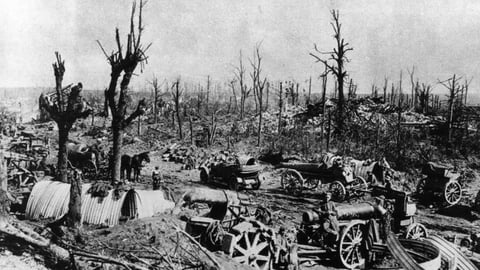World War I Lessons: The Value of Human Life
God has blessed us with the gift of life. Studying World War I can help us see how little value men have placed on that precious gift. (Part 2 in a series.)

The First World War was a catastrophe that cost millions of lives around the world. Of the 65 million men mobilized in the war, 37 million became casualties. In other words, approximately 57 percent of the men in the armed services throughout World War I were killed or wounded, became prisoners of war or went missing in action.
Why? How did all of this death and destruction happen? Even more important, what can we learn from this staggering loss of life?
Outdated techniques and modern technology
One of the biggest problems that made World War I so bloody was the use of outdated techniques to fight against modern technology. The main strategy in the Western front of the war was to send a group of soldiers with bayonets and rifles charging toward another group of men with machine guns across a field laced with barbed wire. A rather accurate portrayal of this can be viewed in the World War I-themed movie War Horse.
The battlefield tactic of charging an enemy in this way had been less dangerous when the enemy was armed with swords, spears or muskets (which took time to load and were very inaccurate). Charging toward machine guns, however, turned out to be suicidal for thousands of men. Due to the use of such methods, casualty reports such as 21,000 dead on the first day of a month-long battle became the norm.
This death and destruction occurred because political leaders and military commanders didn’t fully value the lives of their men. Instead of trying to find less dangerous ways for their men to fight the war, the leaders of the time kept using the same tried and true tactics they had known all of their lives—throwing away millions of lives in the process.
This has actually been a human problem down through history. Political leaders have used young men as pawns in their geopolitical games.
To add to the terrible irony of the situation, many historians believe the whole war was fought due to a desire to display national power and strength against competitors—what historians call hyper-nationalism. That pride cost over 8.5 million men (not including civilians) their lives.
Human-devised strategies of warfare show a lack of respect for human life by using young men, with their whole lives ahead of them, to die for the physical purposes of political leaders.
Gift of life
According to the Bible, it is God who gives life to all living things (Acts 17:25). God is our Creator and the giver of life. Genesis 1:26 reveals the origin of human life as God said, “Let Us make man in Our image, according to Our likeness.”
Man is a special creation that God made to be like Him for a very special purpose—to be a part of His family and share His nature and power (Hebrews 2:10; 1 John 3:1-2). For more on our amazing potential, read our article “Children of God.”
The value of a life
If we are made in God’s image and destined to be God’s children, then human life is extremely valuable. Reflecting this value, God established a law protecting human life in His eternal moral law (Exodus 20:13; Matthew 5:21).
Yet, do we see this respect for human life throughout history and in our society today? Human-devised strategies of warfare show a lack of respect for human life by using young men (with their whole lives ahead of them) to die for the physical purposes of political leaders.
Today, a view of murder rates by country also shows that devaluing human life is a worldwide problem. Abortion, too, is a major way that societies—especially Western nations—show disregard for human life.
God has called us to something much greater. We are to respect and treasure the lives of others. Instead of murdering, we are to love our enemies (Matthew 5:44). Instead of killing the innocent, we are to care for those who are weaker than we are (James 1:27).
Each human life is truly a gift of God. The leaders of World War I seemed to forget that, and millions died as a result. But looking at casualty statistics only tells part of the story. We cannot begin to wrap our minds around the other effects of these deaths—the effects on families and future generations—and the accomplishments that those who died never had the chance to achieve. Some have called it the “lost generation.”
One lesson we should learn from this terrible conflict is that we should always have the highest regard for human life—valuing it the way our Creator does.
This is the second in a four part series on World War I Lessons. To read part 1, see “The Importance of History.” To continue the series, see part 3 “The Danger of Greed.”
To learn more about the spirit behind God’s Sixth Commandment forbidding murder, read our article, “Sixth Commandment: You Shall Not Murder.”
Date Posted: July 21, 2014



